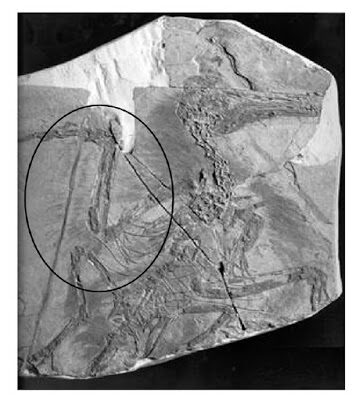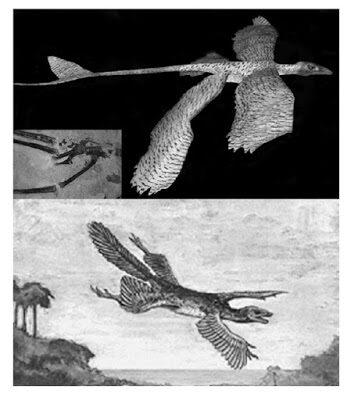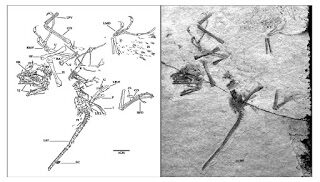Herein we conclude, from part 1 and part 2, considering Alan Feduccia who is the S. K. Heninger Distinguished Professor (Emeritus) within University of North Carolina at Chapel Hill’s Biology Department.
Specifically, his article “Bird Origins Anew,” The Auk – An International Journal of Ornithology, Vol. 130 No. 1 January 2013 AD (bold and underlining emphasis has been added for emphasis).
Alan Feduccia not only elucidates cladistics but criticizes it as follows:
Cladistics is a statistical comparison of large numbers of humancoded, often trivial, skeletal features, that are computer ordered in hierarchical fashion to produce a branching cladogram that, although naive, becomes the true family tree or phylogeny until a competing cladogram, using the same methodology, offers a differing phylogeny.
This may sound good yet:
Aside from the obvious problem of circularity (reciprocal illumination), given myriad complexities, such a simplistic approach to the exceedingly complex problem of phylogenetic reconstruction is unreasonable, especially in view of so many morphological phylogenies being negated by subsequent DNA comparisons (Feduccia 2012b).
He then asserts that “evolution is not always gradualistic and linear”:
Even in 1860, Thomas Huxley warned Charles Darwin not to unnecessarily burden himself with his rigid gradualistic view of evolution, expressed as “natura non facit saltum” (nature does not make jumps) and instead saw evidence of the possibility of saltation, or sudden macroevolutionary change. Hence, the phenomenon of heterochrony, or differences in the timing of development—known to have played a significant role not only in vertebrate origins but also in the evolution of birds, and quite possibly in human evolution—is impossible to deal with by the current methodology.
These last two quotations are reminiscent of the following statements about the fact that Darwinian evolution is a theory about everything and thus, a theory about nothing; see the article Is evolution a theory about everything or nothing?
For example, Roger Highfield wrote:
Under certain conditions of human evolutionary history outgroup alliances are highly advantageous whereas under others close ingroup alliances better promote survival.[1]
Quite right yet, the point is that you cannot simply say evolution’did’it as, in that case, evolution does it all and explains nothing at all.
Do-While Jones stated:
Notice that if things are similar, it is evidence of evolution. It shows they have a common origin. But, if things are different, it is evidence of evolution. It shows that they have changed over time. Since similarity is evidence of evolution, and difference is evidence of evolution, everything is evidence of evolution![2]
Jones also wrote:
Here’s where the evolutionists go wrong. Whenever two similar species have similar genetics, they claim it is proof of a common ancestor. For example, the fact that human DNA is similar to chimpanzee DNA is claimed as proof of a common ancestor. But, when humans and hummingbirds have identical genes (which apes lack) it is claimed to be proof that the same genes can evolve independently. Evolutionists aren’t consistent.[3]
Philip S. Skell noted:
Natural selection makes humans self-centered and aggressive — except when it makes them altruistic and peaceable. Or natural selection produces virile men who eagerly spread their seed — except when it prefers men who are faithful protectors and providers. When an explanation is so supple that it can explain any behavior, it is difficult to test it experimentally, much less use it as a catalyst for scientific discovery.[4]
With regards to Game Theory, Benjamin Wiker pointed out the following:
By using games with fewer rules than Candy Land, the Darwinian game theorists are claiming ‘to uncover the fundamental principles governing our decision-making mechanisms.’ We’d better take a closer look, starting with their presuppositions … The answer seems to be that whatever has survived must be the most fit; therefore whatever exists must have been the result of natural selection. Fairness exists; therefore, it must be the result of natural selection. Q.E.D. It is always convenient to have a theory that cannot possibly be proved wrong.[5]
Furthermore:
The inability of the methodology to deal with common phenomena of vertebrate history, notably massive convergence, mosaic evolution (acquisition of characters at different rates in different lineages), and heterochrony (differences in developmental timing commonly seen in flightless birds), renders the entire scheme nonfunctional…
The arrogance and boldness that characterize the certitude of the cladistic catechism allow no intrusion from other fields and seem oblivious to many important biological phenomena. Being based almost solely on statistical comparisons of simplistically coded skeletal characters, the infallibility with which results are treated is totally unjustified and unscientific.
He refers to:
…a field dominated by mechanistic computer-based phylogenies that rely largely on skeletal similarities.
Ultimately, the conclusion is:
It is time to move beyond the unchallengeable orthodoxy currently shrouding the field of bird origins.
Of course, this is obviously not about science but about, as aforementioned, interpretations of evidence based on worldview philosophies, schools of thought, bias for preferred theories and seeking to protect them, professional rivalries, assuring grants/funding, etc.
~~~~~~~~~~~~~~~~~
Notes:
[1] Roger Highfield, “Does a poor upbringing make you more left wing?,” Daily Telegraph, 23 May 2007 AD
[2] Do-While Jones, “Comparative Anatomy Vindicated,” Disclosure, Jan 2012 AD, Vol 16, Issue 4
[3] Do-While Jones, “Daffy DNA –
New research links lobsters with cockroaches,” Disclosure, Feb 2015 AD, Vol 19, Issue 5
[4] Philip S. Skell, “Why Do We Invoke
Darwin? – Evolutionary theory contributes little to experimental biology,” The Scientist,
August 29, 2005 AD—Skell is a Member of the National Academy of Sciences and Emeritus Evan Pugh Professor at Pennsylvania State University
[5] Benjamin Wiker, “Playing Games with Good and Evil: The Failure of Darwinism to Explain Morality, Crisis,” Discovery, 1 May, 2002 AD—FYI: Candy Land is a “Hasbro” board game for children ages 3 and up.
~~~~~~~~~~~~~~~
Reference:
Feduccia, A. 2012b. Riddle of the Feathered Dragons: Hidden Birds of China. Yale University Press, New Haven, Connecticut
~~~~~~~~~~~~~~~~~~~~~~~~
A plea: I have to pay for server usage and have made all content on this website free and always will. I support my family on one income and do research, writing, videos, etc. as a hobby. If you can even spare $1.00 as a donation, please do so: it may not seem like much but if each person reading this would do so, even every now and then, it would add up and really, really help. Here is my donate/paypal page.
Due to robo-spaming, I had to close the comment sections. However, you can comment on my Facebook page and/or on my Google+ page. You can also use the “Share / Save” button below this post.



